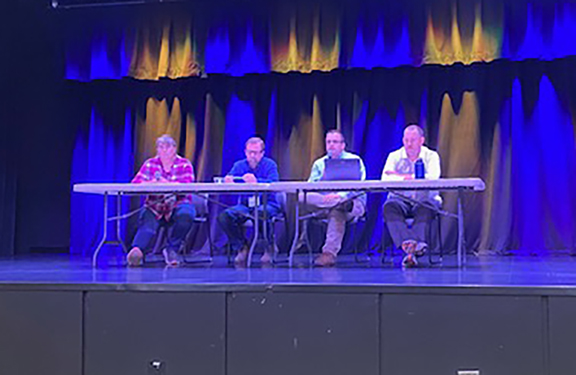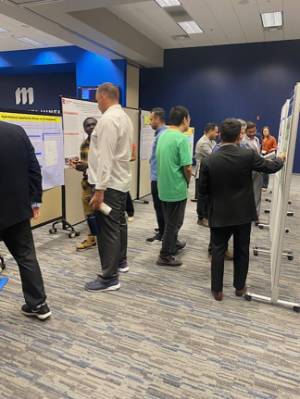South Dakota Mines Hosts Nation's First Hydrochar and Biochar Conference

Nearly 70 experts from around the United States recently gathered at South Dakota Mines to collaborate on improving the production and use of hydrochar and biochar, carbon-rich solid materials created by processing biomass such as pinewood and corn stover, specifically for use in soil health.
“In addition to soil amendment, both char products have multiple potential applications in energy storage, as cement additives, and in steel manufacturing,” said Anu Shende, Ph.D., Mines associate research professor.
The conference brought together insights and ideas from academia, industry, national labs, small businesses, the U.S. Department of Agriculture (USDA), and nonprofits.
“These interactions highlighted barriers to applying char products from thermochemical technology for soil health and developing new approaches to overcome these barriers,” Anu said.
The USDA-Agriculture Food Research Initiative (AFRI) awarded $50,000 to Anu and Rajesh Shende, Ph.D., Mines professor and interim department head of the Karen M. Swindler Department of Chemical and Biological Engineering, to organize a conference on hydrochar and biochar, with a focus on hydrochar. The USDA grant supported travel and lodging for attendees from all over the United States to Rapid City for the two-day conference.
“The USDA, Department of Energy and other grant agencies, industries, and other stakeholders are interested in exploring hydrochar applications," Anu said.
Hydrochar is a product of hydrothermal liquefaction (HTL), a sustainable process that generates hydrochar, bio-oil and an aqueous co-product rich in organic acids and phenolics.
The conference aligned with Anu and Rajesh’s more than decade-long research involving HTL processing of biomass, such as agricultural and forest residue, to produce fuels and bioproducts such as hydrochar. The pilot scale has spurred interest in exploring large-scale production and application of hydrochar.
While last week’s event was the first in the United States, Anu said they are working on forming The International Hydrochar Academy (IHA), which will organize annual conferences at different locations worldwide.
The conference also featured student posters and oral presentations on char-based products. Winners included:
Oral Presentations
- Best oral presentation prize ($500): Adsorption of Harmful Algal Bloom Toxins on Pyrolyzed Hydrochars by Cadianne Chambers; Department of Biomedical and Chemical Engineering and Sciences, Florida Institute of Technology, Melbourne, Fla.
- Second Prize ($275): Effect of Hydrothermal Carbonization Temperature on Nutrient Recovery from Animal Manure by Bilas Devnath; Department of Chemistry and Chemical Engineering, Florida Institute of Technology, Melbourne, Fla.
- Third prize ($150): Isamu Umeda: High Purity Hydrochar Production from Organic Waste Using Supercritical Methanol by Isumu Umeda; Civil & Environmental Engineering, Old Dominion University, Norfolk, Va.
Poster Presentations:
- Best poster presentation prize ($300): Fabrication of Biodegradable Films from Soyhulls Lignocellulose to Address Plastic Perils by Sumi Regmi and Srinivas Janaswamy; Department of Dairy and Food Science, South Dakota State University (SDSU), Brookings, S.D.
- Second Prize: ($175): Can Biochar and Manure Enhance the Efficiency of Cover Crops and Improve Soil Health by Varshith Kommineni, Department of Agronomy, Horticulture and Plant Science, SDSU, Brookings, S.D.
- Third Prize: ($100): Strong Biodegradable Packaging Films from Alfalfa Cellulosic Residue by Sandeep Paudel and Srinivas Janaswamy; Department of Dairy and Food Science, SDSU, Brookings, S.D.